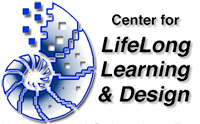
|
| Home |
| Philosophy |
| People |
| Grants |
| Projects |
| Courses |
| Meeting Schedule |
| URA Program (Jobs) |
| Contact Us |
The Center for LifeLong Learning & Design
The Center for Lifelong Learning & Design (L3D) is part of the Department of Computer Science and the Institute of Cognitive Science at the University of Colorado at Boulder. The mission of the center is to establish, both by theoretical work and by building prototype systems, the scientific foundations for the construction of intelligent systems that serve as amplifiers of human capabilities.
Major Sponsors
 |
||
 |
 |
 |
 |
 |
 |
Global Research Goals
Our goal is to establish, both by theoretical work and by building prototype systems, the scientific foundations for the construction of intelligent systems that serve as amplifiers of human capabilities (e.g., to expand human memory, augment human reasoning, and facilitate human communication). A prerequisite for intelligent systems is that we understand the information processing possibilities and limitations of the human and the computer. We apply basic, qualitative theories of human thinking to guide the design of innovative systems. Our systems should not only be significant as technical achievements in computer science, but also because they are based upon principled analyses of how one can best help people to cope with complex information systems. Working in intelligent systems, it is not sufficient to know how to build these systems; one must discover which systems are worth building.
Knowledge-Based Systems (KBS) and Human-Computer Communication (HCC) are two crucial research areas for these goals. We are especially interested in understanding the possibilities of pursuing these two research areas together. The rationale for this approach is that on the one hand effective human-computer communication is more than creating attractive displays on a CRT screen: It requires providing the computer with a considerable body of relevant world knowledge as well as knowledge about the psychological characteristics and understanding of the user; on the other hand, the use of knowledge-based systems and expert systems will be severely limited if we are unable to eliminate the communication bottleneck.
In our current research effort, innovative system development, cognitive theory construction, and evaluation are combined and centered around the following themes: cooperative problem solving, user-centered design, intelligent support systems (e.g., critics, advisors), intelligent information management, construction kits and design environments, human problem-domain communication, explanation and visualization components, reuse and redesign, programmable applications, and learnable language design.
Integration
The Center for Lifelong Learning and Design is part of the Department of Computer Science and the Institute of Cognitive Science. It part of the Intelligent Systems Group (an association of a large number of different institutions at the University of Colorado which are interested in artificial intelligence research). It participates in the Human-Computer Interaction Consortium (which brings together research groups from the USA and Europe working in HCI). It cooperates and has active research relationships with other universities, research laboratories, and industry.
New Things / Ideas
L3D is engaged in the envisioning, designing, developing and assessing of socio-technical environments that will bring dramatic and transformative improvements in the ways people live, learn, work, and collaborate.